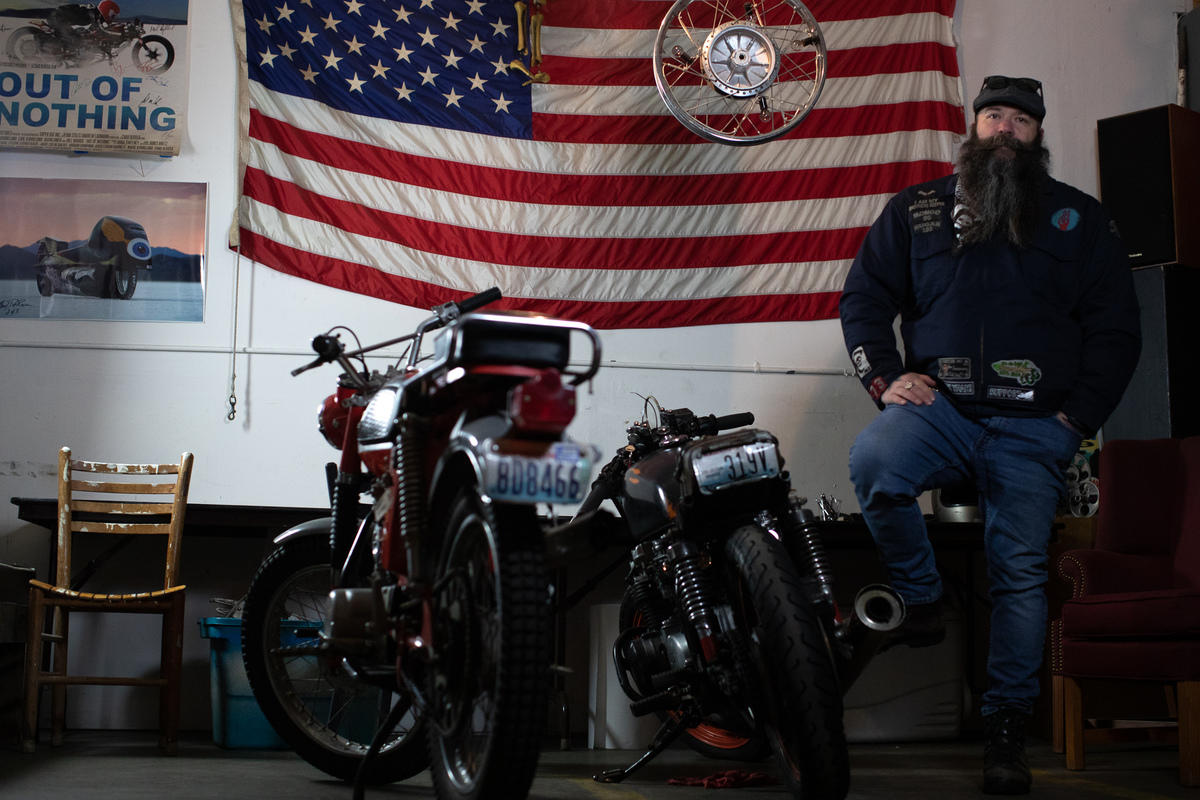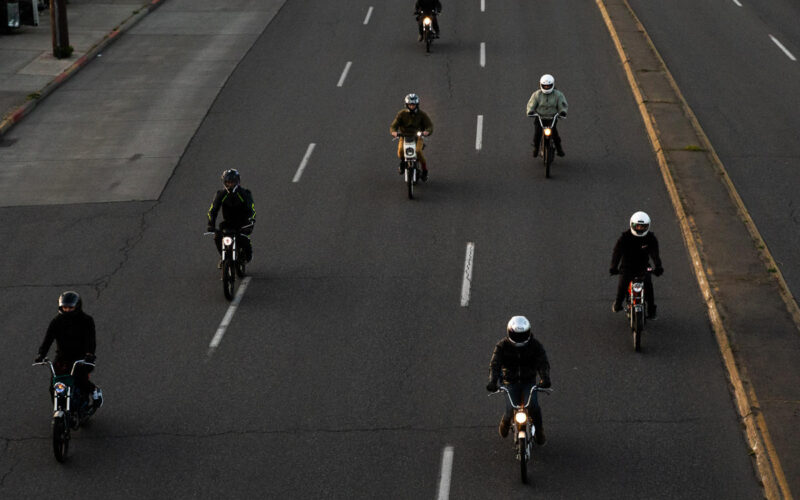Long before he was president of the Cretins Motorcycle Club, Nick Ziehe was just a kid growing up in Renton, fascinated by his dad doing a complete overhaul of a Honda CB350.
The bike was a vintage racer, but one his father heavily modified. Ziehe recalls his dad plopping him on the seat of this “odd” looking bike for short rides on backroads around Lake Washington. In high school, when his friends were getting their first cars, Ziehe got his first bike, which he rebuilt with his dad.
Today, Ziehe, 48, works at Boeing as a manufacturing engineer, and for the past five years has led the Ballard-based Cretins Motorcycle Club (aka Cretins MC Seattle), which he joined 10 years ago. Among members, Ziehe is known as “Double Tap.” The club’s preferred bikes are vintage cafe racers, with an aesthetic hearkening to 1960s London.
The glue that holds the Cretins together is the love of riding. Spring usually marks the beginning of the riding season, when members take group rides and share the feeling of the road rolling out under their feet. But this spring is different.

The global coronavirus pandemic put the group’s planned March 28 spring opener ride on hold. The annual Taco Dash (a fundraiser involving minibikes, silly games and homemade tacos) scheduled for May 2, is up in the air. And the customary, rain or shine, Thursday night dive bar meet-ups (Cretin Nights) have gone virtual, from vroom-vroom to Zoom.
Washington is home to an abundance of motorcycle, moped and scooter clubs. In addition to the Cretins there are dozens of groups, including Jewish riding club The Tribe, the Moped Army’s Seattle branch, Los Gatos Gordos and women-only riding groups. According to the Washington Traffic Safety Commision, as of last year there were 237,976 registered motorcycles (this includes mopeds and scooters) in Washington, accounting for 3% of all vehicles registered in the state. Additionally, there are 429,238 people licensed to drive motorcycles.
For many, the longer, warmer days of spring signal a return to the road. Bikers start rolling motorcycles out of garages, and groups convene for scenic rides along highways lined with pines and miles of ocean coast. But Gov. Jay Inslee did not include motorcycle rides on the list of acceptable public activities during the coronavirus stay-at-home order.
“It’s not legally prohibited, but it’s a terrible idea at the moment,” Mike Faulk, Inslee’s press secretary, says by email. “People should limit travel to limit exposure and transmission. This is a legitimate crisis. Adventure can wait.”
Despite the rebellious reputation of motorcycle riders, the Cretins aren’t rule breakers.
“The motorcycle thing is obviously kind of a sticking point for us because we can’t go and ride together,” Ziehe says. “At the same time it’s the human aspect…. I want to make sure that my buddy is good and everything is copacetic. But I can do that online.”
While group rides are off the table, for now, Ziehe and other members still go out for solo rides along desolate stretches of roads to avoid people and practice social distancing as much as they can. A bonus: With traffic significantly down, the roads are more wide open than ever.
“It’s easy for me to hit a backroad and just get lost,” says Ziehe, who now lives in Maple Valley. “Riding a motorcycle is so therapeutic — it’s not like driving a car.”
For bikers, going on rides offers a kind of solitude that people who are socially distancing might not be able to achieve while visiting a park and working hard to stay 6 feet away from the dozens of other people trying to grab their own bit of sunshine.
“You got the wind blowing across you, and you can relax and take everything in,” Ziehe says. “It’s a good way to de-stress from everything that’s going on around you.”
But some bikers are rebels with a cause.
Last week, Doug Davis, president of local Jewish motorcycle club, The Tribe, rode with a small caravan of eight people from Bellevue to Anacortes.
“The truth of the matter is because everybody is homebound and we have a lot of retired and semiretired people, we are riding much more,” says Davis, 66. “If you ask most of us what the number one thing they want to be doing, it’s usually going to be motorcycle riding. You’re out on the road — just you and nature.”
Not all members of The Tribe have chosen to go on rides. But a subgroup of the Bellevue-based posse of mostly 60-somethings have gone out at least twice a week for the past five weeks. And while the group of riders, who primarily own Harley Davidsons, are in an age group that’s considered more vulnerable to coronavirus, Davis says they’re doing everything they can to stay safe.
By Washington state law, motorcyclists are required to wear helmets, which can range from half helmets to full head coverage. Some helmets have face shields; riders in The Tribe who don’t have a face shield wear cloth face masks. (As is customary in biker culture, they also wear leather gloves.) They stay 6 feet apart while on their feet and when out on the road at upwards of 60 miles per hour, they keep two bike lengths between them.
And The Tribe isn’t the only local group that’s taking their chances on the newly empty roads.
Alex Sokolowski owns Magic Touch Mopeds, a full service garage in Seattle specifically for mopeds. He says his business currently has a steady influx of customers, but it’s not nearly as busy as it usually is around this time of year. And when customers do call in for an appointment, some get cold feet when the time comes to drop off their bike.
“We’ve definitely taken a hit because mopeds are generally a social thing,” Sokolowski explains. “Even if you don’t have any problems, the first thing you would want to do when you get your bike running is go visit the moped shop to show it off.”
Sokolowski is also the president of the Moped Army’s Seattle branch, which has 25 active members. As of now, official club business is indefinitely postponed. But some in the moped community, including Sokolowski, meet up for “social distance rides” on Sundays and “moped Mondays.”
“We’ll ride out and then disband at the end of the ride,” Sokolowski says. “Which is different from the way we usually do moped Monday.”
Because the moped’s engines are smaller than those in motorcycles, riders go for shorter distances. And especially now, they are avoiding winding roads.
“It’s obviously not the time you would want to have any sort of incident and visit the ER,” Sokolowski says. Additionally, he says, no one in the club who’s gone out for a ride has exhibited symptoms of the virus. (The CDC cautions that even asymptomatic people can spread the coronavirus.)
“Everybody that I know has been taking the quarantine pretty seriously, and has put a lot of thought into making the decision to go out and socially distance with our moped rides,” he says.
One event still in question is the annual “Mods and Rockers” ride, a June tradition that nods to the historic rivalry between Mods (scooter riders) and Rockers (motorcyclists). Legend has it the two subcultures battled it out on the beaches of Brighton, U.K., in 1964, in a fight that lasted two days. But these days the event is cause for friendly celebration of the two-wheeled lifestyle.
“The Cretins are great. I’ve partied with them many times,” Sokolowski says of the “rocker” club. “They’ve opened their clubhouse to us before and we’ve hosted parties there in the past.”
More than 80 riders on scooters, motorcycles and mopeds usually gather for Mods and Rockers — the mods starting their engines on one side of town, the rockers on the other. After meeting in the middle, the squads join forces and ride to a bar and afterparty.
Ziehe hopes the stay-at-home order isn’t extended into June, so that the Mods and Rockers can take to the road for the commemorative ride.
“We’re just holding out to make that decision to pull the plug on all of our events,” he says. “We’re not the only ones waiting and getting antsy.”
Regardless of the rules, Ziehe expects there will probably still be some riders who say, “I’m going to put on my leathers,” and do a solo ride on June 1 to honor the clash of cultures. But it isn’t the same.
“It’s such a group dynamic; that’s what makes it — that belonging,” Ziehe adds. “You’re never going to get the feeling [elsewhere] like when you’re actually at an event or riding with your fellow riders. You can’t replace it.”
Make sure you have subscribed to our Facebook page to stay tuned!
Source: Crosscut
